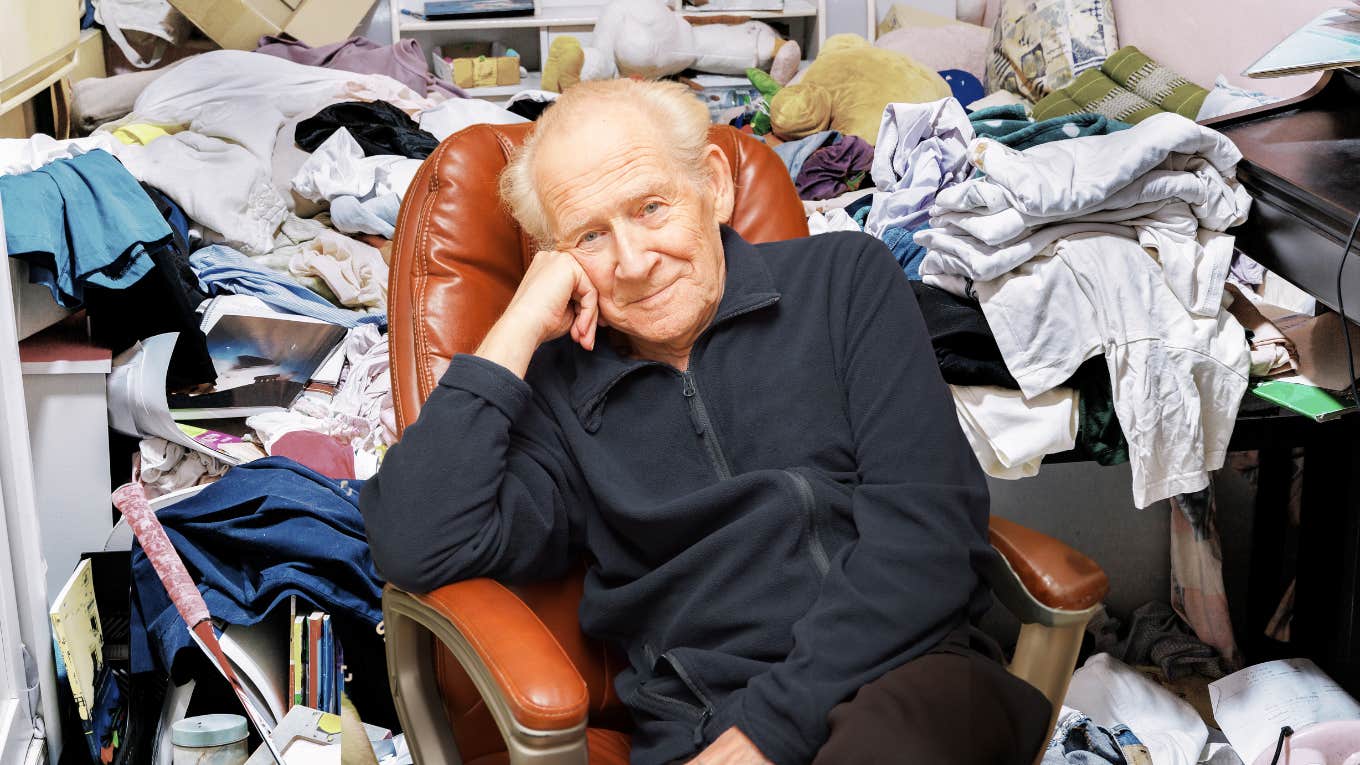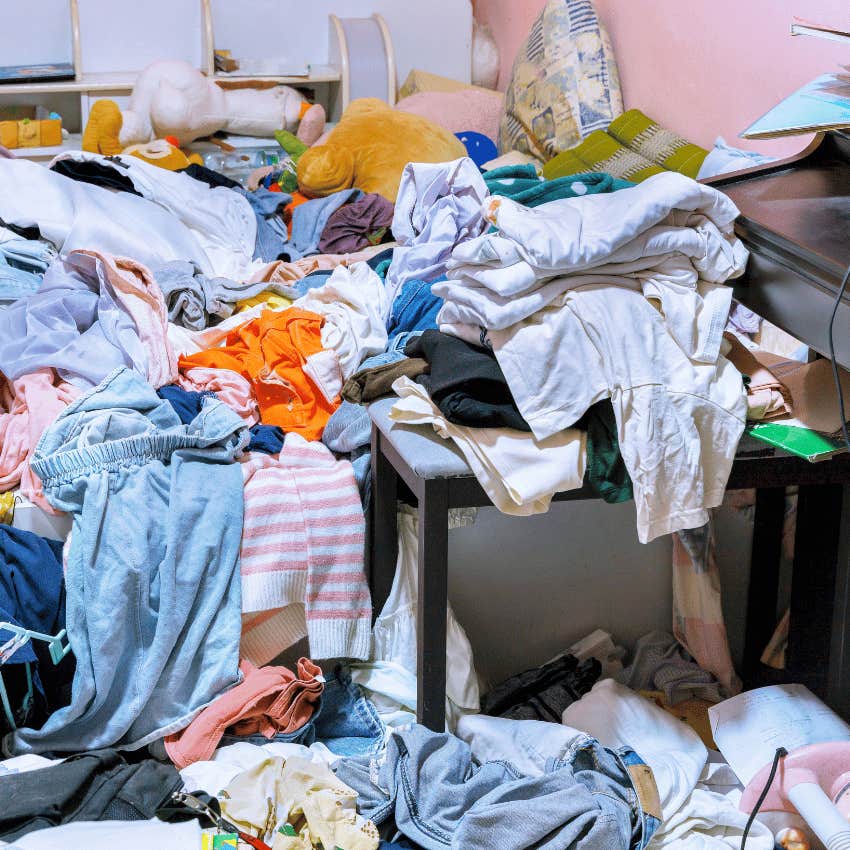Hoarding Took My Friend's Life — 'He Slept On A Recliner Because It The Only Spot He Had For Himself'
I watched his vigor slowly fade, and there was nothing I could do.
 Anna Lurye, Warut Chinsai | Shutterstock
Anna Lurye, Warut Chinsai | Shutterstock To protect the privacy of those involved, the names in this story have been changed.
“G’night,” Ben says. “Heading back to the house.”
The house.
“Have you ever noticed that you don’t call your place ‘home’?” I ask.
He tips a solemn nod in my direction. “Because it isn’t.”
Ben’s wife was a hoarder.
Over a couple of years that we’d been close friends, I’d slowly come to learn more about his daily reality through little comments, always delivered with a weary expression. The house. The storage locker. The clutter collection.
Ben never called the place he returned to every night “home.” But as we spent more time together, I realized he did everything he could to avoid being there.
It seemed whenever I went downtown, I bumped into Ben. Ben having lunch alone in a restaurant, with servers who knew him by name and knew exactly what he was going to order. Ben doing tai chi in the park on World Tai Chi Day. Ben attending parades, musical events, and festivals. Always alone, but surrounded by people who knew him, at least superficially, and were happy to see his smiling face. But I saw the sadness behind his eyes.
A few months into our friendship, Ben asked me what had drawn me to him, and why I made a point to strike up conversations and ask him to share a meal with me. He had a knack for asking surprising questions. Ben loved people.
“My humans!” he would say.
I pondered for a moment.
“Well, it’s obvious you’ve got tons of friends and everyone loves you. Everywhere you go, people know you.”
“That’s true,” he said. There was no pride or arrogance in his voice, he simply accepted my words as fact. People knew him. Everyone loved him.
“But for someone surrounded by people, you seem like the loneliest person I’ve ever met.”
Ben looked down. “You see a lot,” he said.
“I guess I just hoped we could help each other be less alone.”
 Ron Lach | Pexels
Ron Lach | Pexels
I’d been friends with Ben for a year before he let me see his house, at least from the outside.
Ben’s car was in the shop, and I picked him up so we could go to a concert together. When I pulled into his driveway, I saw a simple one-story rambler, probably built in the ‘80s, that looked much like the other surrounding houses. The lawn was mowed. A front walkway garden was overgrown with weeds and two creeping yew bushes threatened to overtake the driveway, but it was otherwise unremarkable — unless you looked closer.
Despite the gorgeous, sunny winter day — a rarity in the rainy Pacific Northwest — curtains blocked every window except for a small sliver that revealed a stack of white banker’s boxes. A solitary putty-colored plastic lawn chair rested outside the front door. The garage door opened. Boxes and plastic storage tubs filled the two-car garage from floor to ceiling. I watched as Ben, a slender man, sidled sideways through a narrow canyon amidst the overwhelming clutter.
At the time, I didn’t say anything. I didn’t want to grill Ben about his living conditions. Some people used their garages for storage, didn’t they? Who was I to judge? But as we drove toward the concert, Ben was uncharacteristically quiet, gazing out the window. I’d never known him not to fill our time with conversation.
“Everything okay?” I asked.
“I guess you saw,” he said quietly. “Denise, my wife, is a packrat.”
I forced a small chuckle. “Oh, well, I’ve seen cluttered garages before.”
“Is that what you call it? ‘Clutter’?”
“What do you call it?”
He thought for a moment. “Well, we’re in a support group called Clutter Club, so I suppose you could call it clutter.”
“But …?”
“I call it garbage.”
Throughout our friendship, I would learn more about Denise’s clutter and Ben’s response to it. Ben had told me early on that Denise had bipolar disorder. It took him longer to admit that she also had a hoarding disorder, although he rarely referred to her as a hoarder.
I learned that Ben had one spot in the overflowing house to call his own — a La-Z-Boy recliner.
He often slept there when he was exhausted, and would answer my texts hours later saying: “Sorry. Recliner claimed me.”
Ben roamed relentlessly, mostly living out of his car. He kept it stocked with cases of water from Costco, bags of walnuts for on-the-go protein, and even a change of clothes. He spent his days haunting the YMCA, yoga classes, coffee shops, and restaurants. He volunteered to sing in a half dozen musical groups, two of which performed at local senior living communities and memory care facilities.
Although he was in his early 70s himself, Ben often said, “I love my old people!” as though elders 15–20 years his senior belonged to him and it was his responsibility and privilege to bring them joy. Maybe it was because we were so close, but I didn’t notice when Ben began to deteriorate; it was our mutual friends who pointed it out.
“Is he okay?” they asked, knowing I spent more time with him than anyone.
“He’s fine,” I’d respond. “Why do you ask?”
“He just looks … older.”
Time passes, I thought. Don’t we all look older?
 Warut Chinsai | Shutterstock
Warut Chinsai | Shutterstock
Eventually, I noticed — Ben did seem to have slowed. He didn’t just look older, he looked exhausted.
I asked if everything was okay, and whether I could help if it wasn’t. I learned that Ben had been showering at the Y because his water heater was broken. I told him I knew a handyman who could probably take a look so he wouldn’t have to call an expensive plumber.
“Cost isn’t the problem,” he said. “I’ve gotta get that space cleaned up before we can have somebody in the house.”
I told him I knew a few contractors and repair technicians and every one of them had mentioned how they were inured to messy, cluttered houses. They’d seen it all. Ben shook his head.
“If they see this, they’ll report it.”
I blinked. “You mean, if they see your living conditions?”
He nodded.
“It’s that bad?”
He nodded again.
“How bad?”
He pursed his lips. I could tell this admission was difficult for him, embarrassing. But he closed his eyes, swallowed, and said, “If you’ve seen the garage, you’ve seen the house.”
When COVID struck and the entire world shut down, Ben lost his only coping mechanism.
Dining in restaurants or hanging out in coffee shops was out of the question — all of those venues were closed. Elder care facilities went on lockdown, so he could no longer escape into preparing performances for his “old people.” Movie theaters closed, live music was canceled, and singing with others became hazardous as choirs experienced superspreader events/
And Ben grew smaller and smaller, shrinking into himself. His texts from the recliner became more numerous, and his one joy became sending me photographs of comic strips he liked from the Sunday paper or pages from his new favorite book, which I’d bought him for Christmas, Brandon Stanton’s Humans.
In time, the world began to reopen. But Ben never did. His once-bright light had faded, and nothing I did — inviting him out to dinner, taking him to concerts, dragging him along on short adventures — revived his spirit. I was losing him.
Ben died suddenly, but as I processed the loss I realized that he’d been taken from me gradually, a piece at a time.
All of his running, and hiding from his painful reality, caught up with him. I’d never met Denise — she was like Boo Radley, a haunted recluse. I’d heard tales of her kindness, generosity, and infectious laugh. Although Ben rarely spoke of her, and she never accompanied him or watched him perform in local concerts, he’d told me she was funny. She was also, he said, an “angel” who thrived on helping others, usually financially.
But I couldn’t help but feel anger toward her. If her hoarding hadn’t forced Ben to either live in or run from squalor, I thought, then he would have lived to become a member of his favorite demographic — an “old person.” I needed to understand how someone could live as Denise chose to live, forcing her husband to live the same way.
I took to watching the A&E series Hoarders, hoping to find some compassion within myself for the person I knew I blamed for Ben’s decline and inevitable death. I read articles about hoarding, too, to gain as much understanding as I could.
I learned that hoarding disorder isn’t a character deficit, and hoarders aren’t slovenly for the sake of it, per the Cleveland Clinic. The compulsion to hoard is a mental illness. It’s often accompanied by other mental illnesses like depression, PTSD, or bipolar disorder. Hoarders experience significant distress when faced with the challenge of discarding objects, no matter how useless, broken, or unsanitary they may be.
I found myself worrying about Denise. How would she fare with Ben gone? I argued with myself about whether I should report the house and her living conditions, although I’d never seen beyond the garage.
But I knew Denise had friends and neighbors who kept an eye on her, and it felt wrong to risk upending her life, especially since I’d learned that the prognosis for hoarders generally isn’t good. The American Psychological Association found that although treatment can help hoarders manage and even reduce symptoms, relapse is common.
I wondered how anyone could live like Denise, and despite everything I learned, I still struggled to find compassion for the woman whose refusal to deal with her compulsions seemed to have led to the death of someone I loved.
Then, while watching a woman on Hoarders struggle to part with a damaged, grungy teddy bear that had “seen her through hard times,” I flashed on a memory that helped me uncover a shred of empathy.
 Andrea Piacquadio | Pexels
Andrea Piacquadio | Pexels
When I moved 2,000 miles from the Upper Midwest to my new happy place in the Pacific Northwest, my adult children, who came west with me, helped me purge nearly everything we owned.
We set out with the dog, our clothes, some essentials, and a small collection of cherished memorabilia. If it didn’t fit in my minivan, it didn’t come. When it comes to moving, I’m the opposite of a hoarder. My life is by no means minimalist, but I have no problem getting rid of things when the pressure of a move is on.
We’d packed outgrown and outdated clothing into heavy plastic bags to haul away to a nearby charity donation bin. My daughter Shayla had heaved the bags into the car, and we’d sped off to discard them. We were so exhausted, both emotionally and physically, that after we dropped off the clothes, we drove in lazy circles in front of the closed supermarket, laughing and shouting as we chased up the parking lot seagulls in great squalling clouds.
But our merriment ended a few days later. As moving day descended, my son Ian asked if I’d seen his black wool peacoat. He couldn’t find it among the bags of stuff, and he wanted to be sure it was safe. As we searched bags, Shayla made a discovery.
“This is a bag of Dad’s old stuff!” she cried. “This is what I thought we donated.”
We learned that instead of taking my soon-to-be ex-husband’s bag of clothing to the drop box (with his blessing), we’d taken a bag that was supposed to have gone with us. A bag that contained not only Ian’s coat but also Shayla’s long wool coat.
I sobbed. I couldn’t help myself. I was uprooting my entire life to make this move, and although I knew it was for the best and I desperately wanted to go, losing items that were special to my kids tore something open inside of me.
Ian’s coat was iconic. We’d found it at Goodwill, and when Ian put it on it had fit as though it was custom-made for him. The inside label read “Made in East Germany,” so we’d known our find was a vintage treasure. Every time I’d picked the kids up from high school, I’d watched Ian stroll out in that peacoat. The same was true when I went to visit him at college.
Shayla’s wool coat had been an extravagant gift. Shayla spotted it when my mom had taken her shopping for the start of her freshman year of high school. Although Shayla had insisted the coat was too expensive, my mom gleefully tossed it into her cart, saying, “It’s only money! I won’t be able to spoil you when I’m dead.” Mom died that winter.
I reflected on how profoundly the loss of two items affected me, and it helped me understand how someone might become so attached to stuff that it overwhelmed their life.
Hoarders, I realized, experienced a similar emotional trauma. They became distressed at the idea of parting with a broken toaster or a bag of their 40-year-old child’s baby clothes. I couldn’t imagine feeling that level of anxiety any time I was challenged to part with something. No matter how insignificant a broken toaster might seem to me, it was on the level of a cherished wool jacket for a person with a hoarding disorder.
Did hoarding kill Ben? He died in a hospital, not a pile of rubble. Although respiratory arrest factored in his death, I don’t know for certain whether his living situation contributed to respiratory issues. Not only was he a private person, but he may not have noticed air quality problems. People living in hoarding situations can become “nose blind,” desensitized to things like foul odors, mold, or mildew.
But I do know that his wife’s disorder kept Ben unmoored, with no place he could call “home.” It forced him to live like a transient. Despite my anger and loss, I’m relieved to have found a well of compassion for her within myself.
Karen Lunde is a career writer and editor who has crafted over 100 articles on writing and grammar for Grammarly and edited Macmillan Publishers' popular podcasts, including grammar celebrity Grammar Girl. She was an online education pioneer, founding one of the first online writing workshops, and currently provides writing tips and writing coach services at HelpMeWriteBetter.

